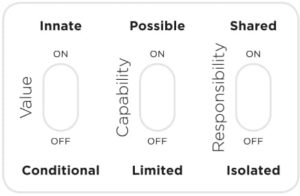
Three Steps for Giving Feedback With Compassionate Accountability
Share viaHonest, constructive feedback is critical for anyone in order to improve their performance. And, feedback is fraught with landmines. Have you experienced any of the following when giving or receiving feedback?
- Defensiveness
- Unsolicited advice
- Criticism
- Beating around the bush
- Condescending tone
- Focusing only on the negatives
- Lack of psychological safety
For feedback to work, it has to be delivered with Compassionate Accountability; which is the process of building connection WHILE getting results. By using the Compassion Mindset framework, we can identify the features of great feedback and how to do it well.

The Compassion Mindset has three switches, each one representing one necessary, but not sufficient, component of compassionate accountability. They all work together to create the best conditions for feedback to work.
Value
When giving feedback, treat people as valuable. What does this mean?
- Separate the person from the behavior. Never criticize the person’s integrity, character, or intentions; e.g. “What’s wrong with you.” or “Act like a leader.”
- Don’t lead with assumptions. If you are unsure why they did what they did, check in with them about it.
- Value their lived experience. Each person’s experiences are valid, even if you can’t relate.
- Empathize if you can relate.
- Share your motives for giving feedback, especially if you are experiencing emotional turmoil related to it. People feel a lot safer receiving feedback when they know why it matters to you and why you care.
Capability
When giving feedback, treat people as capable of making positive change and being part of the solution. What does this mean?
- Get permission. Unsolicited advice is nonconsensual helping. It undermines autonomy and agency.
- Make sure your feedback is constructive and developmental. Are you sharing something that can help them improve, grow, and learn? Or are you trying to tear them down?
- It’s OK to give specifics, but don’t dwell on what’s wrong.
- Build on strengths. Nothing builds confidence more than amplifying a strength.
- Be curious. You only know your experience, not theirs. They know their experience better than you do, so stay open-minded about what they might be able to contribute.
- It’s OK to ask curious questions, not leading questions. This isn’t a trial, so avoid questions where you’ve already made up your mind or are trying to trap someone, e.g. “Don’t you think you should have asked me first?” or “What were you thinking?”
- Above all, frame feedback as a joint process of reconnecting, finding common ground, and problem-solving together.
Responsibility
When giving feedback remember that you are 100% responsible for your thoughts, feelings, and behaviors. No more, no less. And so is the other person. What does this mean?
- Avoid pointing fingers, blaming, or trying to corner someone, e.g. “You are the reason we keep failing.” Contrary to what you might think, isolating responsibility is the best way to invite defensiveness and undermine ownership.
- Manage your own feelings. If you aren’t in control of your own anxiety, fear, or uncertainty, you will likely project that onto others.
- It’s OK to appeal to boundaries, principles, and goals. These are the standards that help ensure excellence and continuous improvement.
- Avoid threats and ultimatums. Fear may work in the short term, but your employee will be looking for another job if it continues.
- Make new commitments. What will they do differently going forward? What will you do differently to support their success?
Compassionate Accountability Feedback Conversation Starters
See if you can identify where each Switch of The Compassion Mindset is turned on in these feedback conversation starters.
I’m feeling anxious about something. May I share what I observed yesterday at our meeting? It’s important to me that we keep communication open and honest between us.
I can see how embarrassed you were earlier. I can relate. I have some information that might be helpful to understand what happened if you are interested. I’m committed to supporting your development here at ProcessCorp.
That was a rough game. I’ve got your back. I see a couple of things we could adjust, and I’m curious what you see. You are always so good at making adjustments. I’ll be sure to let you know when you are doing it right. What will you do differently in the next game?
I’m uncertain how to interpret your comments earlier and I don’t want to make any assumptions. What was your intention for what you said to Jose in the meeting? It’s important that we ensure psychological safety in all our interactions.
There are so many creative ways to give feedback with compassionate accountability. Here’s another great resource from my friend, “The Teamwork Doctor,” Liane Davey. When we treat ourselves and others as valuable, capable, and responsible, everybody wins.
Copyright Next Element Consulting, LLC 2023
Transform Your Culture With Compassionate Accountability
Book Your Next Keynote Speaker

Author and Co-founder of Next Element, Dr. Nate Regier is available to speak at your upcoming event.
Submit a Speaker RequestPodcast: Listen to Nate "On Compassion"
 Listen to the Podcast
Listen to the Podcast



2 Comments
Hi Nate; thanks for this again! Very much so!
Interesting: from my life with an airline: FEEDBACK is not performance assessment, but a message back to the sender for what the effect of that sender’s behaviour is on me – as each ‘sender’ has accountability for the effect of any behaviour on others. (Addressing someone not in channel has an effect, and describing that effect on me is what we call ‘FEEDBACK’).
Your notes re FEEDBACK in regard to performance assessment are highly appreciated and are valid – seen from my perspective of having done airline pilot training and regular ‘Simulator Checking’ of active airline pilots for years.
Thank you Werner. Your perspective means alot, especially coming from your first-hand experience.
Add comment
Add comment
Thanks also Nate for the very useful framework and tips to check and to get started. I also like Werner’s comment “FEEDBACK is not performance assessment, but a message back to the sender”. As an engineer working on feedback control systems, feedback is a signal from a sensor to report on what happened somewhere in the system, and that is used by the control part of the system to make a decision about taking action. Too often we think of ourselves as the control system as well as the sensor providing information that can be useful in decision making. Your points about respect for the receiver emphasize this perspective perfectly, making collaboration of what to do with that information possible. I have learned when receiving advice or criticism to ask the giver, “Thank you for that advice, can you share with me what you saw that led you to offer that help to me?” That has sometimes led to an interesting insight we both missed,
Great perspective, John. Thanks for sharing. Now I should write a post on “How to get and receive feedback with compassionate accountability.”
Add comment
Add comment
Add comment